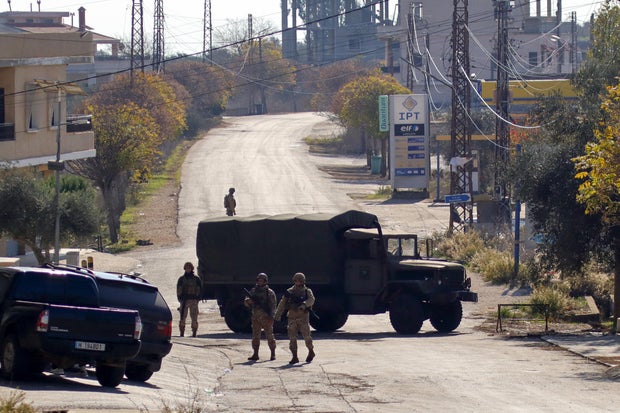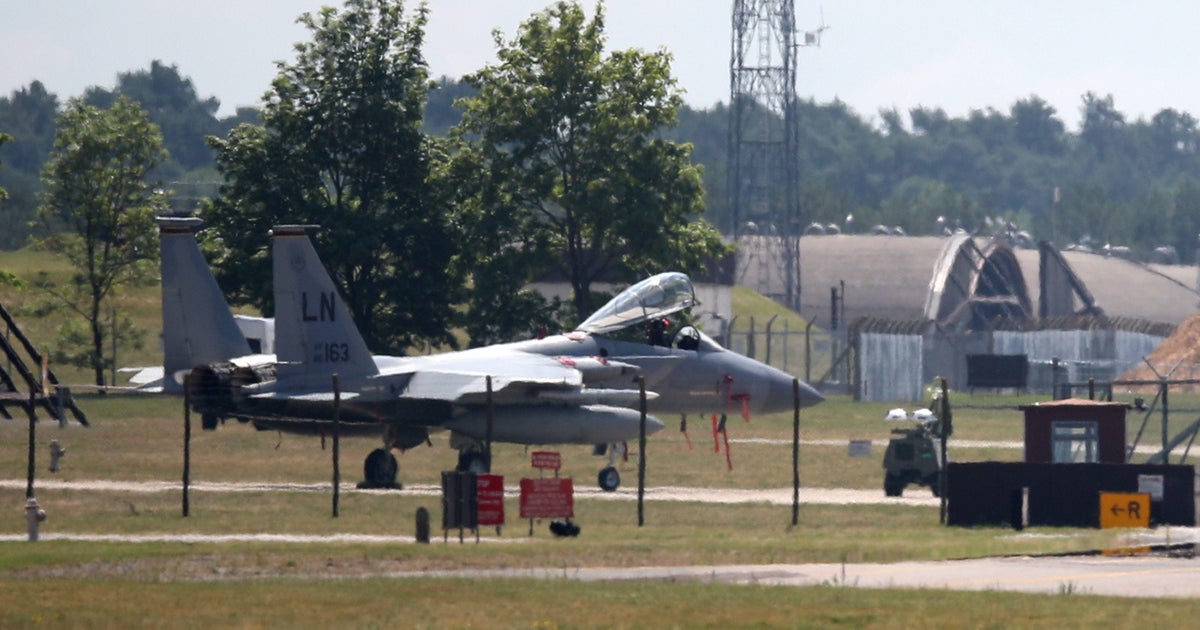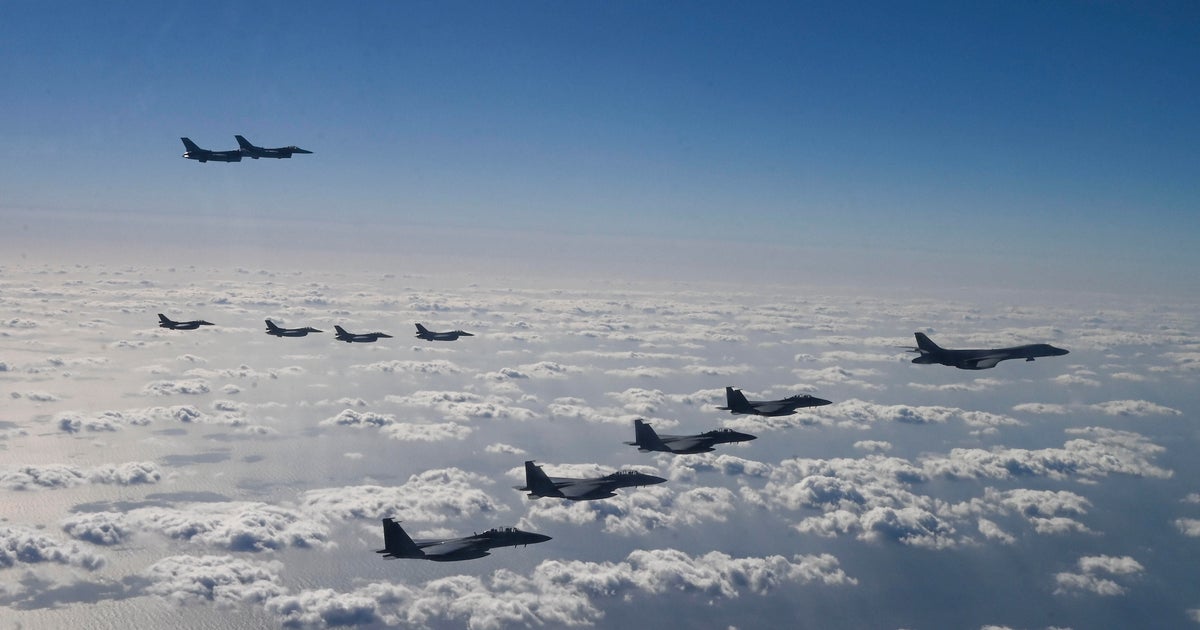Israel and Hezbollah both claim ceasefire violations
Beirut — Israel on Thursday carried out its first airstrike on Lebanon since a truce with Hezbollah announced this week, saying it targeted the militant group's activity at a rocket storage facility in southern Lebanon that breached the ceasefire.
Lebanese authorities reported scattered incidents of Israeli mortar attacks, strikes and shots fired that wounded two people trying to return to southern Lebanon. Lebanon's state-run media said the wounded were civilians, while the Israeli military described them as suspects who violated the terms of the truce that ended more than a year of conflict between Israel and Hezbollah.
The Israel Defense Forces said in a statement that "several suspects were identified arriving with vehicles to a number of areas in southern Lebanon, breaching the conditions of the ceasefire. The IDF opened fire toward them."
"The IDF remains in southern Lebanon and will actively enforce violations of the ceasefire agreement," the military said.
Lebanon's state-run National News Agency said Israeli fire wounded two civilians in Markaba, a village close to the border that has been a scene of intense fighting over the past 14 months. It also reported Israeli tank fire hitting some villages and farms in the south, causing no casualties.
The bursts of violence — with no reports of serious casualties — reflected the uneasy nature of the ceasefire that otherwise appeared to hold Thursday as Lebanese troops began to deploy in parts of southern Lebanon, the eastern Bekaa Valley and the southern suburbs of Beirut, where Hezbollah has based its operations.
The Lebanese military said it was setting up temporary checkpoints and detonating unexploded ordnance in hopes of helping displaced civilians return to their homes.
Some 1.2 million people were displaced in Lebanon during the country's deadliest war in decades. Thousands of residents, their cars stacked high with mattresses and full of belongings, began to make the odyssey back to their war-ravaged towns on Wednesday, after the ceasefire took effect.
But their movements remain constrained. The Lebanese and Israeli militaries have ordered civilians displaced from border communities to steer clear of areas where Israeli troops are still in position.
Col. Avichay Adraee, an Arabic language spokesman for the Israeli military, announced that a nighttime curfew for Lebanese residents south of the Litani River remained in effect, banning movement from 5 p.m. Thursday until 7 a.m. Friday.
The Lebanese army also accused Israel of breaking the ceasefire several times on Thursday by conducting strikes on Lebanon with "various weapons" and continuing to patrol and surveil Lebanese skies with warplanes and drones. The army said it was "following up on these violations in coordination with the relevant authorities," without elaborating.
An Associated Press reporter in northern Israel near the border heard Israeli drones buzzing overhead and the sound of artillery strikes in Lebanon.
Hezbollah has not issued any public statements on the alleged Israeli ceasefire violations but Hezbollah lawmaker Hassan Fadlallah acknowledged the incidents. When asked by reporters how Hezbollah would respond, he was cautious.
"We don't want to rush things," he said, adding that Hezbollah "has the right to self-defense."
The agreement, brokered by the United States and France, includes an initial two-month ceasefire in which Hezbollah militants are to withdraw north of the Litani River and Israeli forces are to return to their side of the border. As Israeli forces withdrawal, the buffer zone will be patrolled by Lebanese troops and U.N. peacekeepers moving in to take their place, but it is expected to take weeks, and Israel retained full security control over both sides of the border region as of Thursday.
Lebanon's state-run National News Agency said two people were wounded by Israeli fire in Markaba, close to the border, without providing further details. It said Israel fired artillery in three other locations near the border. There were no immediate reports of casualties.
While the detailed terms of the ceasefire agreement have not been made public by the U.S., President Biden made clear when he announced it on Tuesday that Israel retained the right to self-defense, and Israeli Prime Minister Benjamin Netanyahu warned that any violations of the deal would be met with a swift and harsh military response.
Israeli officials have said forces will be withdrawn gradually as it ensures that the agreement is being enforced. Israel has warned people repeatedly not to return to areas where troops are deployed, and says it reserves the right to strike Hezbollah if it violates the terms of the truce.
The ceasefire agreement announced late Tuesday ended 14 months of conflict between Israel and Hezbollah that began a day after Hamas' Oct. 7, 2023 attack out of Gaza, when the Lebanese militant group began firing rockets, drones and missiles in solidarity. The Hamas attack saw the militants kill some 1,200 people in southern Israel and take 250 others hostage.
Israel retaliated with airstrikes, and the conflict steadily intensified for nearly a year before boiling over into all-out war in mid-September. The war in Gaza is still raging with no end in sight, with health officials in the Hamas-run Palestinian territory saying more than 44,280 people have been killed. Most of the enclave's 2.3 million people have been displaced from their homes, many of them forced to flee multiple times over the last year.
More than 3,760 people were killed by Israeli fire in Lebanon during the conflict, many of them civilians, according to Lebanese health officials. The fighting killed more than 70 people in Israel, meanwhile, more than half of them civilians, as well as dozens of Israeli soldiers fighting in southern Lebanon.
Some 50,000 people were displaced on the Israeli side, but few have returned and the communities near the northern border are still largely deserted.




